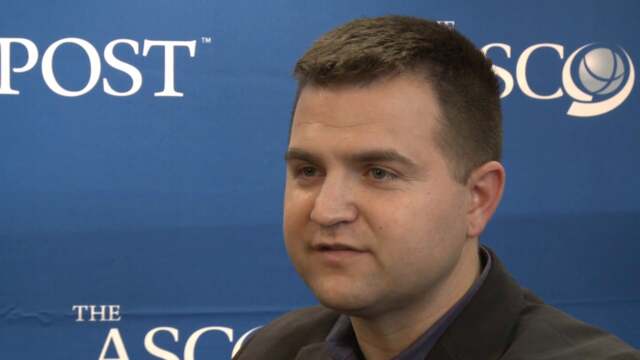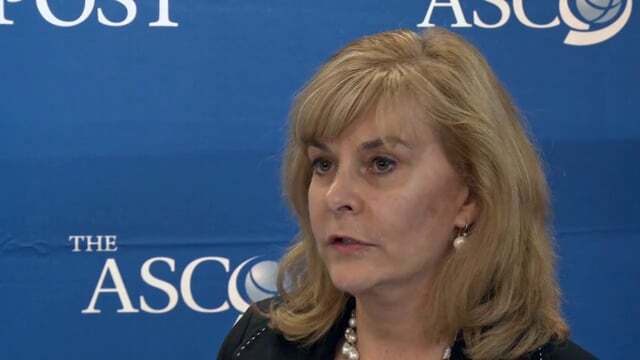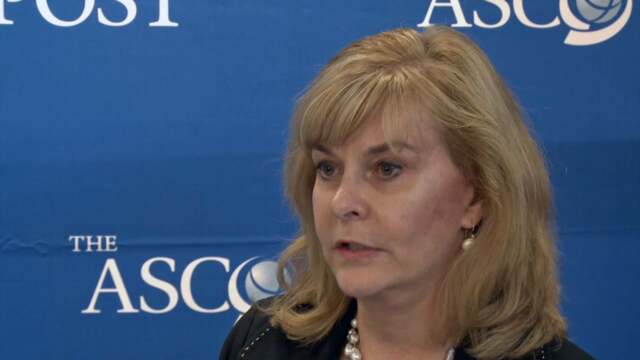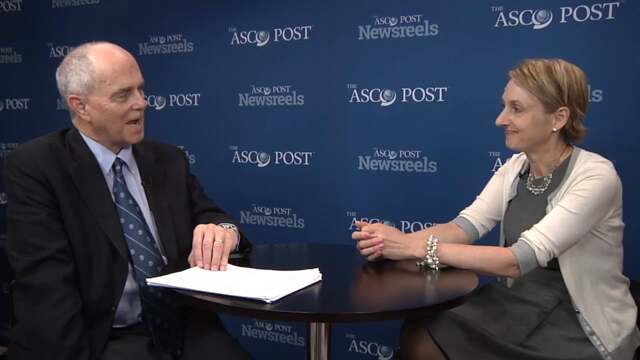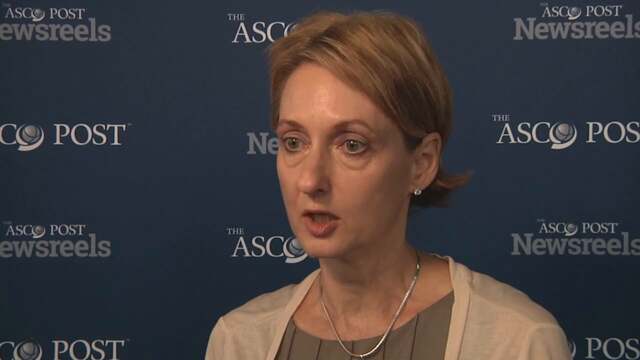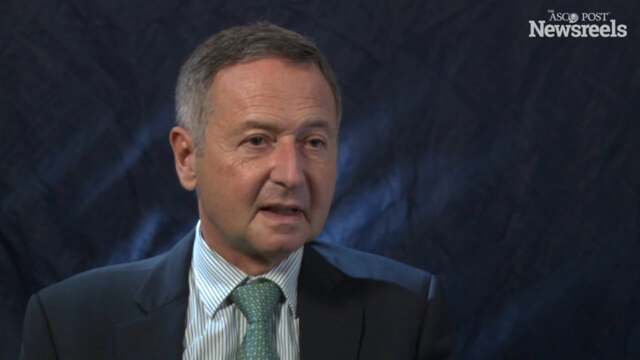Autologous Stem Cell Transplantation Offers Safe, Effective Option for Patients With HIV-Associated Lymphoma
A phase II, multicenter trial published by Alvarnas et al in Blood challenges the generally held belief that individuals with human immunodeficiency virus (HIV) and aggressive lymphoma are not candidates for standard treatment. According to the researchers, people with HIV-associated lymphoma who...
European Study Suggests No Benefit of GnRH in Preserving Ovarian Function and Fertility in Young Women With Lymphoma
In long-term follow-up of a European trial reported by Demeestere et al in the Journal of Clinical Oncology, gonadotropin-releasing hormone (GnRH) agonist treatment during chemotherapy in young women with lymphoma was not associated with reduced premature ovarian failure or an improved pregnancy...
ASCO 2016: Cancer Diagnosed More Often in Patients With Primary Immunodeficiency Disease
Primary immunodeficiency disorders are a group of more than 300 single gene defects that affect the role of the immune system and prevent it from functioning properly. When Roswell Park Cancer Institute (RPCI) researchers evaluated the overall and site-specific incidence of cancer among patients...
Sagar Lonial, MD, and Andrew Zelenetz, MD, PhD, on MCL, DLBCL, CLL: How Much Rituximab Is Enough?
Sagar Lonial, MD, of Emory University School of Medicine, and Andrew D. Zelenetz, MD, PhD, of Memorial Sloan Kettering Cancer Center, discuss newly reported findings on rituximab maintenance therapy in hematologic malignancies (Abstracts 7503, 7504, and 7505).
Nivolumab in Classical Hodgkin Lymphoma
On May 17, 2016, nivolumab (Opdivo) was granted accelerated approval for treatment of patients with classical Hodgkin lymphoma that has relapsed or progressed after autologous hematopoietic stem cell transplantation and post-transplantation brentuximab vedotin (Adcetris).1,2 Continued approval for ...
Enzastaurin Fails to Improve Outcomes in Patients With High-Risk DLBCL in Remission After Chemotherapy
Crump et al found no disease-free survival benefit of maintenance therapy with the selective protein kinase Cb (PKCb) inhibitor enzastaurin in patients with diffuse large B-cell lymphoma (DLBCL) who were in complete remission and at high risk of relapse after first-line chemotherapy, according to a ...
James Kochenderfer, MD, on Inducing Remissions in B-Cell Lymphoma
James Kochenderfer, MD, of the National Cancer Institute, discuss results of a small study on genetically modified CAR-T cells, which may well become a standard lymphoma treatment (Abstract LBA3010).
FDA Approves Nivolumab for Heavily Pretreated Classical Hodgkin Lymphoma
On May 17, 2016, the U.S. Food and Drug Administration (FDA) granted accelerated approval to the programmed cell death protein 1 (PD‑1) inhibitor, nivolumab (Opdivo), for the treatment of patients with classical Hodgkin lymphoma that has relapsed or progressed after autologous hematopoietic stem...
FDA Grants Accelerated Approval to Nivolumab in Classical Hodgkin Lymphoma
On May 17, 2016, the U.S. Food and Drug Administration (FDA) granted accelerated approval to nivolumab (Opdivo; Bristol-Myers Squibb) for the treatment of patients with classical Hodgkin lymphoma that has relapsed or progressed after autologous hematopoietic stem cell transplantation (HSCT) and...
Similar Outcomes Reported With ABVD vs BEACOPP in High-Risk Advanced Hodgkin Lymphoma
In a phase III trial (EORTC 20012 Intergroup Trial) reported by Carde et al in the Journal of Clinical Oncology, similar outcomes were achieved with eight cycles of ABVD (doxorubicin, bleomycin, vinblastine, dacarbazine) vs four cycles each of escalated BEACOPP (bleomycin, etoposide, doxorubicin,...
Genomic Profiling of Orbital and Ocular Adnexal Lymphomas
In a study reported in Modern Pathology, Cani et al used next-generation sequencing to identify actionable mutations in orbital and ocular adnexal lymphomas, finding frequent alterations in MYD88 and chromatin modifiers. Study Details The study involved next-generation sequencing of 36...
Amplification of 9p24.1 Associated With Advanced Stage and Poorer Outcome in Classic Hodgkin Lymphoma
In a study reported in the Journal of Clinical Oncology, Roemer et al identified PD-L1 (programmed cell death ligand 1) and PD-L2 genetic alterations in patients with classic Hodgkin lymphoma, finding that 9p24.1 amplification was common and associated with advanced-stage disease and poorer...
Adding Rituximab to Dose-Dense Chemotherapy May Be of Benefit in Burkitt Lymphoma
In a French phase III trial reported in The Lancet, Ribrag et al showed that adding rituximab (Rituxan) to dose-dense chemotherapy improved event-free survival among adults with Burkitt lymphoma. Study Details In the open-label trial, 260 patients were randomized between October 2004 and...
Interim FDG-PET Response-Adapted Therapy May Be of Benefit in Hodgkin Lymphoma
In a phase II US Intergroup trial (Southwest Oncology Group S0816) reported in the Journal of Clinical Oncology, Press et al found that early interim fluorodeoxyglucose positron-emission tomography (FDG-PET) to guide response-adapted therapy resulted in progression-free survival substantially...
FDA Accepts Supplemental Biologics License Application for Nivolumab in Classical Hodgkin Lymphoma, Grants Priority Review
Bristol-Myers Squibb Company announced today that the U.S. Food and Drug Administration (FDA) accepted a supplemental Biologics License Application (sBLA), which seeks to expand the use of nivolumab (Opdivo) to patients with classical Hodgkin lymphoma after prior therapies. The application...
Relatives of Patients With Carcinoma of Unknown Primary at Increased Risk for This and Other Cancers
Relatives of patients with carcinoma of unknown primary are at increased risk of developing it themselves as well as several other malignant neoplasms, including lung, pancreatic, and colon cancers; non-Hodgkin lymphoma; and myeloma, according to a study published in JAMA Oncology. “Some of...
Selected Abstracts From 2015 ASH Annual Meeting: Part 4
Here is the final installment of selected abstracts from the proceedings of the 2015 American Society of Hematology (ASH) Annual Meeting and Exposition, focusing on Hodgkin lymphoma, follicular lymphoma, diffuse large B-cell lymphoma, and chronic lymphocytic leukemia. For other selected abstracts...
MicroRNA miR-181a Reduces NFκB Signaling in Diffuse Large B-Cell Lymphomas
A recent study by researchers at Sylvester Comprehensive Cancer Center at the University of Miami Miller School of Medicine showed that a microRNA called miR-181a dampens signals from the cancer-driving NFκB protein pathway in diffuse large B-cell lymphoma (DLBCL). By reducing NFκB...
Greater Prognostic Value of Ki67 Index vs Cytology and Growth Pattern in Mantle Cell Lymphoma
Hoster et al found that Ki67 index had greater prognostic value than cytology or growth pattern in mantle cell lymphoma, based on data from European Mantle Cell Lymphoma Network randomized trials reported in the Journal of Clinical Oncology. A modified combination of Ki67 index and Mantle Cell...
Italian Study Suggests Benefit of Interim PET Response–Adapted Therapy in High-Risk Advanced Hodgkin Lymphoma
The phase II portion of the Italian HD0801 study suggests that treatment based on positron-emission tomography (PET) performed early in first-line therapy for advanced Hodgkin lymphoma may improve outcome in patients at risk of first-line treatment failure. Zinzani et al reported their findings in...
Obinutuzumab in Relapsed or Refractory Follicular Lymphoma
On February 26, 2016, obinutuzumab (Gazyva) was approved for use in combination with bendamustine (Bendeka, Treanda) followed by obinutuzumab monotherapy for treatment of patients with follicular lymphoma who have relapsed after or are refractory to a rituximab (Rituxan)-containing regimen.1,2...
FDA Approves Obinutuzumab in Follicular Lymphoma
The U.S. Food and Drug Administration (FDA) has approved obinutuzumab (Gazyva), an anti-CD-20 monoclonal antibody, for use in combination with bendamustine (Bendeka, Treanda) followed by obinutuzumab monotherapy for the treatment of patients with follicular lymphoma who relapsed after, or are...
First-Line Ibrutinib Improves Progression-Free and Overall Survival vs Chlorambucil in Older Patients With Chronic Lymphocytic Leukemia
As reported in The New England Journal of Medicine and at the 2015 American Society of Hematology Annual Meeting, Jan A. Burger, MD, PhD, and colleagues found that first-line treatment with the oral Bruton’s tyrosine kinase inhibitor ibrutinib (Imbruvica) improved progression-free and overall...
Early MRI Screening Reduces Risk of Breast Cancer Death for Survivors of Childhood Hodgkin Lymphoma
Researchers at Princess Margaret Cancer Centre have confirmed in a screening effectiveness study that early screening with magnetic resonance imaging (MRI) can reduce breast cancer mortality for female survivors of childhood Hodgkin lymphoma who received chest radiation. The findings published by...
FDA Approves Obinutuzumab in Follicular Lymphoma
The U.S. Food and Drug Administration (FDA) today approved obinutuzumab (Gazyva) for use in combination with bendamustine (Bendeka, Treanda) followed by obinutuzumab monotherapy for the treatment of patients with follicular lymphoma who relapsed after, or are refractory to, a rituximab...
Weight and Height During Adolescence May Impact Future Risk of Developing Non-Hodgkin Lymphoma
A new analysis indicates that higher body weight and taller stature during adolescence increase the risk of developing Non-Hodgkin lymphoma (NHL). The findings were published by Leiba et al in Cancer. Rates of NHL have increased worldwide, and research suggests that rising rates of obesity may be...
Dutch Study Shows Increased Risk of Second Cancer for Survivors of Hodgkin Lymphoma During Long-Term Follow-up
In a Dutch study reported in The New England Journal of Medicine, Schaapveld et al found that survivors of Hodgkin lymphoma treated between 1965 and 2000 were at a 4.6-fold greater risk of second cancer vs the general population during long-term follow-up. There was no significant difference in the ...
Younger T Cells May Improve Immunotherapy for Pediatric Cancer
Pediatric oncologists from The Children’s Hospital of Philadelphia (CHOP) have investigated techniques to improve and broaden a novel personalized cell therapy to treat children with cancer. The researchers say that a patient’s outcome may be improved if clinicians select specific...
Reduction in Late Mortality in Childhood Cancer Survivors in the Childhood Cancer Survivor Study Cohort
In a study reported in The New England Journal of Medicine, Armstrong et al found that late mortality decreased over time among 5-year survivors of childhood cancer in the Childhood Cancer Survivor Study cohort. The reduction is consistent with efforts during recent decades to modify treatment with ...
Higher Mortality Risk in Poor or Minority Adolescents and Young Adults vs White Patients With Hodgkin Lymphoma
Despite improvements in survival for adolescents and young adults diagnosed with Hodgkin lymphoma, the gains have not been shared uniformly across this patient population. A large population-based study by Keegan et al investigating the impact of race/ethnicity, socioeconomic status, influence of...
Laurie Sehn, MD, on Nivolumab in Patients With Relapsed/Refractory Hodgkin Lymphoma
Laurie Sehn, MD, of the BC Cancer Agency, on abstract 289, “Nivolumab in Patients With Relapsed or Refractory Hodgkin Lymphoma: Preliminary Safety, Efficacy, and Biomarker Results of a Phase I Study,” presented by Philippe Armand, MD, PhD.
Laurie Sehn, MD, on Lenalidomide Plus Rituximab in Previously Untreated Mantle Cell Lymphoma
Laurie Sehn, MD, of the BC Cancer Agency, on abstract 625, “Sustained Remission With the Combination Biologic Doublet of Lenalidomide Plus Rituximab as Initial Treatment for Mantle Cell Lymphoma: A Multicenter Phase II Study Report,” presented by Jia Ruan, MD, PhD.
Laurie Sehn, MD, on Brentuximab Vedotin in Diffuse Large B-Cell Lymphoma With Undetectable CD30
Laurie Sehn, MD, of the BC Cancer Agency, on abstract 629, “Brentuximab Vedotin Monotherapy in Diffuse Large B-Cell Lymphoma Patients With Undetectable CD30: Preliminary Results From a Phase II Study.”
Laurie Sehn, MD, on Radiotherapy in Limited-Stage Diffuse Large B-Cell Lymphoma
Laurie Sehn, MD, of the BC Cancer Agency, on abstract 393, “R-CHOP With or Without Radiotherapy in Nonbulky Limited-Stage Diffuse Large B-Cell Lymphoma: Preliminary Results of the Prospective Randomized Phase III 02-03 Trial From the Lysa/Goelams Group,” presented by Thierry Lamy, MD, PhD.
Matthew Lunning, DO, on Ublituximab Plus TGR-1202 in Lymphoma
Matthew Lunning, DO, of the University of Nebraska Medical Center, on abstract 801, “Ublituximab, a Novel Glycoengineered Anti-CD20 Monoclonal Antibody, in Combination with TGR-1202, a Next-Generation Once Daily PI3kδ Inhibitor, Demonstrates Activity in Heavily Pretreated and High-Risk Chronic Lymphocytic Leukemia and B-Cell Lymphoma.”
Bertrand Coiffier, MD, PhD, on the Phase III LyMa Trial
Bertrand Coiffier, MD, PhD, of Centre Hospitalier Lyon-Sud, offers his thoughts on abstract 146, “Rituximab Maintenance vs Wait and Watch After Four Courses of R-DHAP Followed By Autologous Stem Cell Transplantation in Previously Untreated Young Patients With Mantle Cell Lymphoma: First Interim Analysis of the Phase III Prospective LyMa Trial, a Lysa Study,” presented by Steven Le Gouill, MD, PhD.
Julie M. Vose, MD, MBA, FASCO, on Nivolumab in Relapsed/Refractory Hodgkin Lymphoma
Julie M. Vose, MD, MBA, FASCO, of the University of Nebraska Medical Center, offers her thoughts on abstract 289, “Nivolumab in Patients With Relapsed or Refractory Hodgkin Lymphoma: Preliminary Safety, Efficacy, and Biomarker Results of a Phase I Study,” presented by Philippe Armand, MD, PhD.
Bertrand Coiffier, MD, PhD, on Radiotherapy Plus R-CHOP in Localized Diffuse Large B-Cell Lymphoma
Bertrand Coiffier, MD, PhD, of Centre Hospitalier Lyon-Sud, offers his thoughts on abstract 393, “R-CHOP With or Without Radiotherapy in Nonbulky Limited-Stage Diffuse Large B-Cell Lymphoma: Preliminary Results of the Prospective Randomized Phase III 02-03 Trial from the Lysa/Goelams Group,” presented by Thierry Lamy, MD, PhD.
Julie M. Vose, MD, MBA, FASCO, on Ublituximab Plus TGR-1202 in Lymphoma
Julie M. Vose, MD, MBA, FASCO, of the University of Nebraska Medical Center, offers her thoughts on abstract 801, “Ublituximab, a Novel Glycoengineered Anti-CD20 Monoclonal Antibody, in Combination With TGR-1202, a Next-Generation Once-Daily PI3kδ Inhibitor, Demonstrates Activity in Heavily Pretreated and High-Risk Chronic Lymphocytic Leukemia and B-Cell Lymphoma,” presented by Matthew A. Lunning, DO.
Richard M. Stone, MD, on the SWOG S1117 Study
Richard M. Stone, MD, of Dana-Farber Cancer Institute, offers his thoughts on abstract LBA-5, “A Randomized Phase II Study of Azacitidine Combined With Lenalidomide or With Vorinostat vs Azacitidine Monotherapy in Higher-Risk Myelodysplastic Syndromes and Chronic Myelomonocytic Leukemia: North American Intergroup Study SWOG S1117,” presented by Mikkael A. Sekeres, MD, MS.
Julie M. Vose, MD, MBA, FASCO, on the AETHERA trial
Julie M. Vose, MD, MBA, FASCO, of the University of Nebraska Medical Center, offers her thoughts on abstract 673, “The AETHERA Trial: Results of a Randomized, Double-Blind, Placebo-Controlled Phase III Study of Brentuximab Vedotin in the Treatment of Patients at Risk of Progression Following Autologous Stem Cell Transplant for Hodgkin Lymphoma,” presented by Craig H. Moskowitz, MD.
Bertrand Coiffier, MD, PhD, on the RO-CHOP Study
Bertrand Coiffier, MD, PhD, of Centre Hospitalier Lyon-Sud, offers his thoughts on abstract 504, “Final Analysis of the RO-CHOP Phase Ib/II Study: Romidepsin in Association With CHOP in Patients With Peripheral T-Cell Lymphoma (PTCL)” presented by Jehan Dupuis, MD. Time: 1:53
James O. Armitage, MD, FACP, FRCP, and Bertrand Coiffier, MD, PhD, on Managing Lymphoma: The French Perspective
James O. Armitage, MD, FACP, FRCP, of the University of Nebraska Medical Center, and Bertrand Coiffier, MD, PhD, of the Centre Hospitalier Lyon-Sud discuss three French studies on rituximab maintenance vs wait and watch after R-DHAP in mantle cell lymphoma; R-CHOP with or without radiotherapy in diffuse large B-cell lymphoma; and romidepsin and CHOP in peripheral T-cell lymphoma.
Andrew D. Zelenetz, MD, PhD, on Emerging Treatment Options for Lymphomas
Andrew D. Zelenetz, MD, PhD, of Memorial Sloan Kettering Cancer Center, talks about the revolution in lymphoma treatment, which started with rituximab and continues with obinutuzumab, ibrutinib, and others.
Andrew Zelenetz, MD, PhD's Expert Analysis of Two Key Lymphoma Trials: FLASH and GADOLIN
Andrew Zelenetz, MD, PhD, of Memorial Sloan Kettering Cancer Center, discusses two important lymphoma trials presented at ASCO and his views on whether their results are indeed practice-changing (Abstract 8504 and LBA8502).
Laurie H. Sehn, MD, MPH, and James O. Armitage, MD, on Results of the GADOLIN Trial on Indolent Non-Hodgkin Lymphoma
James O. Armitage, MD, of the University of Nebraska Medical Center, and Laurie H. Sehn, MD, MPH, of the British Columbia Cancer Agency, discuss a first-ever finding on obinutuzumab and bendamustine in the setting of rituximab-refractory indolent non-Hodgkin lymphoma (Abstract LBA8502).
Asher Alban Chanan-Khan, MD, and James O. Armitage, MD, on Ibrutinib, Bendamustine, and Rituximab in Previously Treated CLL/SLL
James O. Armitage, MD, of the University of Nebraska Medical Center, and Asher Alban Akmal Chanan-Khan, MD, of the Mayo Clinic Cancer Center, discuss an important treatment option that significantly improved overall response rate and reduced risk of progression or death by 80% (Abstract LBA7005).
Asher Chanan-Khan, MD, Summarizes Ibrutinib, Bendamustine, and Rituximab in Previously Treated CLL/SLL
Asher Alban Chanan-Khan, MD, of the Mayo Clinic Cancer Center, discusses an important treatment option that significantly improved overall response rate and reduced risk of progression or death by 80% (Abstract LBA7005).
Laurie Helen Sehn, MD, MPH, Summarizes Results of the GADOLIN Trial on Indolent NHL
Laurie Helen Sehn, MD, MPH, of the British Columbia Cancer Agency, discusses a first-ever finding on obinutuzumab and bendamustine in the setting of rituximab-refractory indolent non-Hodgkin lymphoma (Abstract LBA8502).
Michael Pfreundschuh, MD, on Treating Lymphoid Malignancies in Children and Adults With the Same Protocols
Michael Pfreundschuh, MD, of Universitaetsklinikum des Saarlandes, summarizes a session he chaired on this topic, which covered Burkitt’s lymphoma as well as lymphoblastic leukemia in children and adults.






